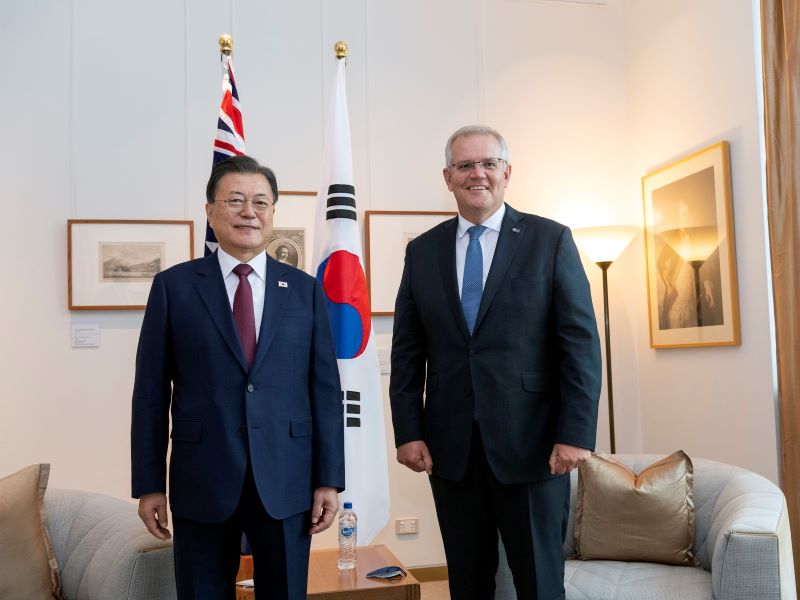The Australian and South Korean governments will invest $100 million in clean energy technologies and critical minerals under a new partnership detailed in Canberra on Monday, when a $1 billion defence deal between the two countries was also struck.
Australia and South Korea – which both rank poorly on climate change action – agreed to a high-level partnership on clean energy and critical mineral supply chains in October ahead of the United Nations Climate Change Conference.
On Monday, details were agreed on during formal talks between Prime Minister Scott Morrison and South Korean President Moon Jae-in in Canberra. The visiting president also met with several key Australian executives in the mining and processing industry.
Under the partnership, Australia will invest $50 million from the $565.8 million allocated to low emissions international technology partnerships in this year’s federal budget.
The Republic of Korea will match the $50 million subject to its domestic processes.

The funding will be used for low emissions technologies like “clean hydrogen”, low emissions iron ore and steel, and the controversial carbon capture and storage, according to Industry Minister Angus Taylor, who was also part of the talks.
The Prime Minister said a new memorandum of understanding between the countries to diversify critical minerals supply chains had also been made and would complement the low emissions technology agreement.
“This is an area where Australia and Korea is already working very closely together to build those reliable trusted supply chains in these critical minerals and rare earths that we know willpower the new energy economy and the global economy into the future,” he said.
South Korean President Moon Jae-in said the two countries shared the view establishing a stable critical minerals supply chain would be a benefit to the global economy.
“We will systematically cooperate throughout the entire resource development cycle including mineral exploration, development, production and mining disaster management, further strengthening human exchange and technical cooperation,” President Moon said. “Today, the two countries have set a new milestone in cooperation based on the solid friendship and trust we have built over the past 60 years we will, together, prepare for a new era.”
The Republic of Korea is already Australia’s third biggest trading partner and has traditionally imported Australian coal, iron-ore and natural gas. But the country has committed to net-zero emissions by 2050, is transitioning it auto industry to electric vehicles, and is already a global leader in the surging electronics and semiconductor manufacturing sector.
Australia has a multi-billion opportunity to supply Korea with more critical minerals resources as economies look to decarbonise and countries look to shift supply chains out of China, according to the Australia-Korea Business Council, which has lobbied for more cooperation under chair and former Labor leader Simon Crean.
On Monday the federal government also announced it had awarded a $1 billion Defence contract to leading Korean contractor Hanwha Defence to supply the Australian Army with self-propelled artillery systems.
The Korean company’s local arm will establish a facility in Geelong to manufacture its Self-Propelled Howitzers and Armoured Ammunition Resupply Vehicles. Construction is expected to begin in the first half of 2022, with production of the Howitzers expected to begin in late 2024.
Do you know more? Contact James Riley via Email.

